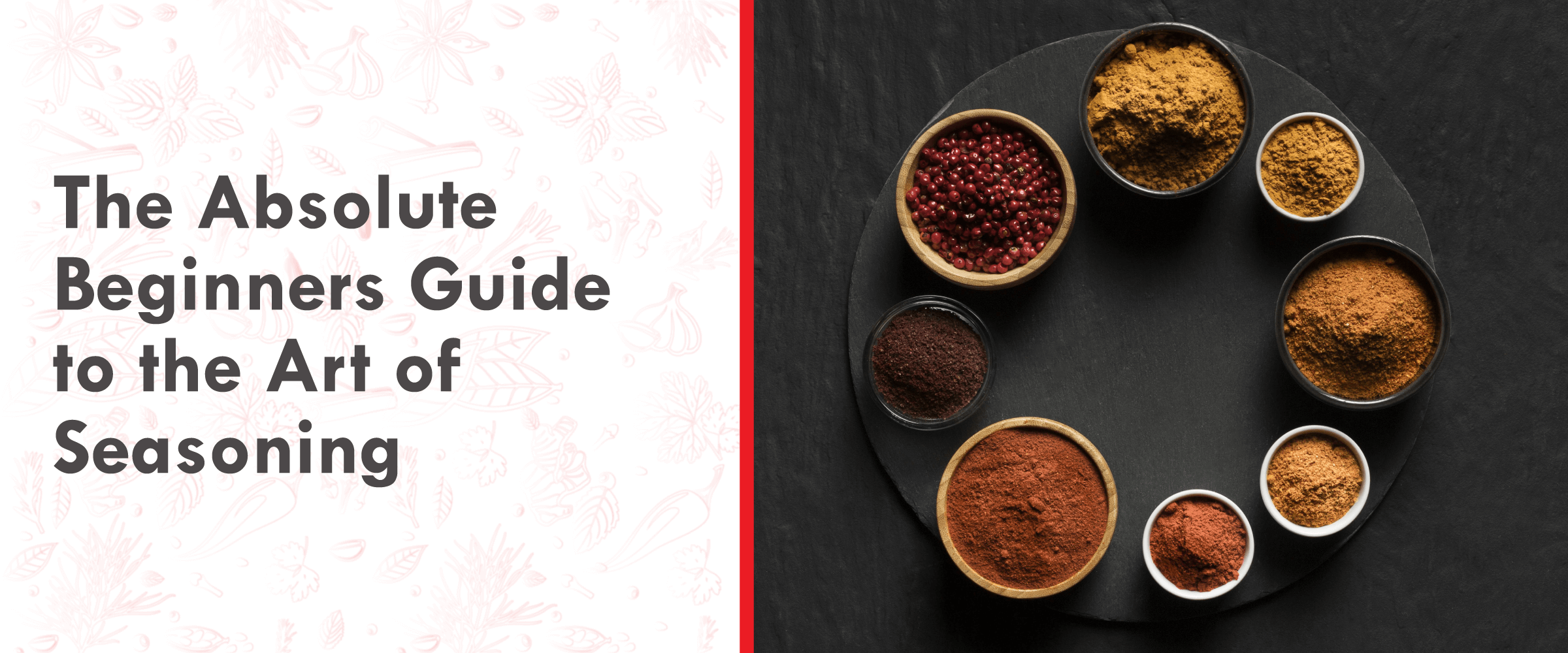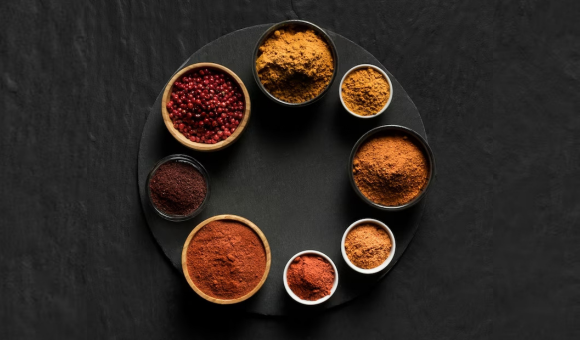
Learn How To Season Food: Beginners Guide
What can enhance the deliciousness quotient of the dish? There is one simple answer, seasoning! The kitchen is a wok, where the chef is the master of culinary alchemy, turning raw ingredients into golden delights with the right seasoning.
You might be wondering: Does using any seasoning make food tasty? The answer is NO! It’s like adding cumin to your pizza—it just doesn’t make sense. The use of seasoning is a science which brings out the best flavours in the basic dish. Seasoning is essential in cooking, turning plain dishes into mouthwatering delights by enhancing their natural flavours. It involves adding spices, herbs, and salts while preparing food. By balancing various flavours like sweetness, saltiness, sourness, bitterness, and umami, seasoning boosts the taste of food. It’s crucial because it not only improves flavour but also ensures a harmonious blend of different tastes.
In this beginner’s guide on how to do seasoning, you’ll learn easy ways to make your food taste better using herbs, spices, and other ingredients.
A] What Is Seasoning?
Seasoning is simply a process of adding herbs, spices, salt and other elements to upgrade the natural flavours and aromas. Many individuals confuse seasoning with flavouring. Flavouring means adding garlic or onion that changes how the food tastes. Seasoning includes ingredients like salt, pepper, herbs, and spices.
The key to successful seasoning is balance, which involves using the right amount of ingredients to achieve a mouthwatering combination of flavours. Too much or too little seasoning can ruin a dish, so it is important to taste and adjust accordingly to achieve the perfect balance of flavours. Today, there are multiple seasoning powders available online, offering a convenient way to enhance the taste of your dishes with just a few clicks.
B] How Do I Go About Seasoning A Dish?
1. Salt
Once the dish is ready, try a bite. Does it taste right, or is it missing something? Maybe it needs more salt. Salt has the power to enhance flavours and elevate the taste of the dish. For example, when salt is added to a tomato, it brings out its natural sweetness and acidity.
Now, let’s talk about choosing the right salt. There’s table salt, harvested from rock deposits, sea salt, gathered from seawater, and kosher salt, known for its large, flaky texture. Each type of salt brings a unique touch to your dish.
If your food gets too salty, you can fix it by adding or mixing in unsalted broth, stock, or sauces. You can also try using fresh herbs like basil, thyme, rosemary, or parsley to enhance the flavour of your food. All these ingredients are essential for seasoning and quite difficult to find, but you can easily get them under one roof at our store. Be careful not to add too much seasoning, because it might not spread evenly and could ruin the dish. Another thing which can ruin a dish is using expired food products. To overcome this, it’s recommended that you only buy premium food products.
We are a leading premium food products supplier, known for providing excellent products. Our goal is to offer the best ingredients, whether you’re a professional chef or cooking at home.
2. Pepper
Pepper is a popular seasoning used to add flavour and depth to a wide range of dishes. It is a versatile spice that can be used in both sweet and savoury dishes, and it comes in many different forms. Black pepper is perhaps the most widely recognized form of pepper, originating from the dried berry of the Piper nigrum plant. It has a bold, pungent flavour, while white pepper has a milder, earthier taste. Green peppercorns offer a fresh, slightly fruity flavour, contrasting with the subtle sweetness and spiciness of pink peppercorns. To make the most of pepper, grind fresh peppercorns to preserve their flavour and aroma. To invent unique flavour combinations try blending different pepper varieties.
Also, it is important to use pepper in moderation, as too much can overpower the other flavours in the dish. It is best to start with a small amount and add more if needed. Taste frequently to ensure that the dish is properly seasoned.
3. Herbs And Spices
Herbs and spices are essential ingredients in cooking, adding depth, complexity, and flavour to dishes. For example, basil has a sweet, slightly peppery flavour and is commonly used in Italian cuisine. Oregano, on the other hand, has a pungent, slightly bitter flavour with a hint of sweetness and is a staple in Mediterranean and Mexican cuisine.
Cumin has a warm, earthy flavour with a hint of sweetness and a slightly bitter aftertaste. It is a key ingredient in many Middle Eastern, Indian, and Mexican dishes, including chilli, curries, and tacos. Paprika has a sweet, slightly smoky flavour with a mild heat and is commonly used in Hungarian and Spanish cuisine, often added to stews, soups, and rice dishes. If you are not in the mood for grocery shopping, you can also order these spices online from the comfort of your home.
4. Balancing Sweet, Sour, Bitter, and Umami
Balancing different flavour profiles is a crucial aspect of creating delicious and well-rounded dishes. To incorporate sweet flavours into your seasoning, you can use ingredients such as sugar, honey, and maple syrup. For sour flavours, you can use ingredients like lemon juice, vinegar and yoghurt. Umami-rich ingredients contribute a savoury, meaty flavour that enhances the overall taste of a dish. If you are not sure about the right balance to prepare the broth, you can try out our readymade chicken broth powder with pre-mixed spices.
5. Lemon
Lemon is a versatile ingredient that adds brightness and acidity to dishes. When using lemon juice in seasoning, it’s important to balance its acidity. If a dish becomes too acidic due to an excess of lemon juice, you can counteract it by adding a tiny amount of baking soda to neutralize the acid. This will help reduce the sourness and bitterness caused by the excess lemon juice. Additionally, you can add some fat, such as butter or cheese, to balance out the lemon flavour.
6. Garlic
Garlic releases its aromatic compounds through processes like sautéing or roasting. To maximize its flavour potential, it’s essential to cook garlic gently, taking care not to burn it. To release the full flavour either crush it or mince it before cooking. Also, add garlic earlier in the cooking process to let the flavour spread in the ingredients.
7. Basil
Basil adds freshness and depth to dishes. Adding basil too early in the cooking process can cause it to lose its flavour and aroma so it’s recommended to add it toward the end of cooking. Basil can be used whole as a pizza topping or layered into a Caprese salad.
8. Ginger
Ginger is known for its spicy and aromatic flavour, making it a staple in various cuisines around the world. In sweet dishes, ginger is often used to add warmth and spice. It is a popular ingredient in baked goods such as gingerbread, cookies, and cakes. Also, ginger can be used to infuse syrups for cocktails or mocktails, adding a refreshing and aromatic element to beverages.
9. Oregano
Oregano is full of antioxidants, like tryptophan, lysine, valine, arginine, vitamin C, vitamin A, and vitamin E. When using oregano in cooking, it is important to use it carefully due to its strong flavour. Oregano can be used fresh or dried, and it pairs well with tomato and often features in pizzas and pasta sauces.
10. Parsley
Parsley is valued for its freshness and vibrant green colour, which can instantly freshen up dishes like salads, soups, stews, and proteins such as fish and poultry. Sprinkle chopped parsley onto your dishes just before serving to add a burst of fresh flavour and visual appeal.
Conclusion
As a Horeca Distributor, we know seasoning for food is a simple way to make meals tastier. With options like herbs, spices, oils, and vinegar, there’s something for everyone. But keep in mind that seasonings have both positive and negative aspects. While they enhance the taste of your dishes, they might also include unhealthy amounts of salt or sugar, which can harm your health. So it’s important to use them in moderation to make your dish healthy and tasty.





